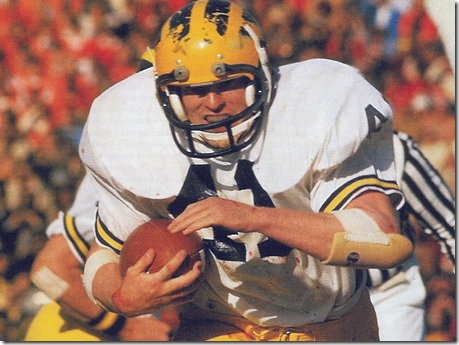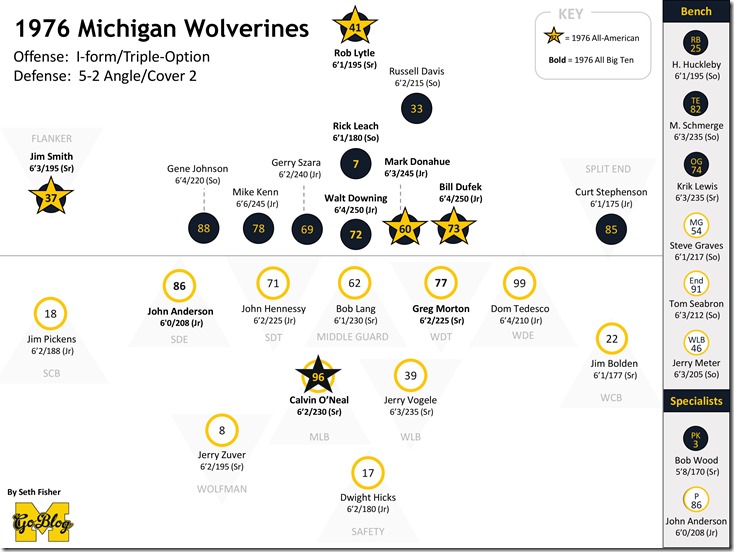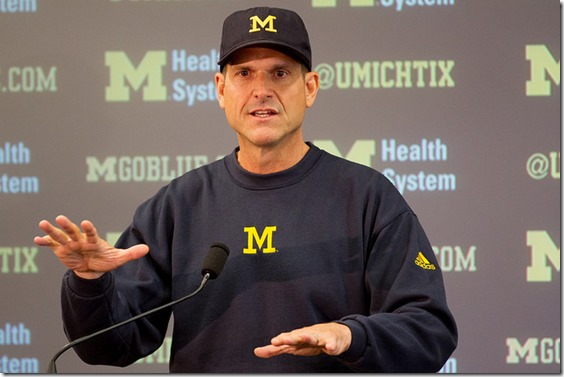rob lytle

2 hours and 52 minutes
Michigan historian Dr. Sap and I have started a new podcast on the lore of Michigan football. And this time we were extraordinarily lucky to have as our guests the defensive captain of the 1976 Wolverines, Calvin O’Neal, and Bo Schembechler’s right hand man and greatest offensive line coach in football history (@ me!) Jerry Hanlon.
Previously: 1980, 1999, 1901, 1964
THE SPONSOR:
It is sponsored by HomeSure Lending. If you're buying or refinancing your home, this is the guy to talk to. He'll work on your loan directly and walk you through a process that can get really confusing really fast. I used him. Brian used him. Everyone else who used him is glad they did.
--------------------------------------------
1. GIMMICKY TOP FIVE: YOU KNOW IT’S A BO SEASON WHEN…
(starts at 1:00)
Seth & Sap set the stage for the Most Bo season of the Bo era. Lots of running, and a loss on natural grass to a future Big Ten West team. Nationally: Pitt had Tony Dorsett, USC, Alabama, and Ohio State were the other contenders. Oklahoma and Texas were great teams too.
2. SETTING THE STAGE
(starts at 11:22)
Preseason #1 to some. Bring back most of the offense, and a fair bit of the defense too, though there’s concern on the defensive line. Bo has open heart surgery in the spring. Coming off the disappointment of 1975. Run through the roster. Story of Mike Kenn: had to wait most of a week after signing day for his LOI because he was 6’6"/205—tried to make him a tight end but according to Hanlon: “It was like throwing the ball against that wall.” Story of O’Neal’s recruitment: Moeller worked him out of heading to MSU, MSU showed up with a limo.
3. THE GAMES PART I
(starts at 48:19)
We go through every game, from the one that Calvin O’Neal got an interception on to the many, many, many games when he did not. Sap plays us some clips from inside the locker room at halftime of the Wake Forest game. Bo gets hollered at for running up the score by putting 70 on the President’s Navy the week after the President visits. Fake punt takes the air out of MSU.
4. THE GAMES PART II
(starts at 1:34:06)
What happened against Purdue? What happened to Illinois when they came for senior day after that? What happened to all the record books after that game, and what was the record for passing touchdowns in a season before? Which Michigan player told Jerry Hanlon he guaranteed not just a win but a shoutout over Ohio State? Which quarterback did they have in Columbus anyway? Who took Ufer’s horn?
5. ROSE BOWL & WRAP
(starts at 2:09:21)
The players are all given hideous blue jerseys to go on the Tonight Show. Also hideous injuries during that game. Hanlon wonders what they could have done to better prepare their teams for those Rose Bowls, because they never had a good performance—Sap suggests it was getting an indoor facility so they could, you know, practice before the bowl games. We talk about where this team fits in the pantheon of teams, MVPs, most overlooked players, and how the players felt when the maize (not yellow) pants came back.
--------------------------------------------
MUSIC
- "The Rubberband Man"—The Spinners
- "The Boys Are Back in Town"—Thin Lizzy
- "Tie Your Mother Down"—Queen
- “Something He Can Feel”—Aretha Franklin
- “Across 110th Street”
THE USUAL LINKS
- Helpful iTunes subscribe link
- General podcast feed link
- Direct download link (right-click/save-as)
- What's with the theme music?
You want to beat your friends
[Upchurch]
News bullets and other items:
- Harbaugh made it abundantly clear that there’s no QB controversy. He said Rudock’s the best QB on the team, and “not by a small margin.”
- Kyle Kalis graded out as the best offensive lineman on Saturday.
- Harbaugh was very impressed with Channing Stribling, saying no one in the secondary has shown more improvement.
- Chesson was the offensive and special teams player of the game, and Lewis was the defensive player of the game.
- Kerridge could possibly play Saturday. He’s “working through something.”
“Whaddaya got? I’m ready to go! I’m excited about my team!”
Can you talk about what you’ve seen out of BYU? What impresses you most about their offense?
“Well, good receivers. Big receivers. Good quarterback. Big, physical team on both sides of the ball. Very athletic. They play extremely hard.
“I think this will be a great test for our team. Very excited about the competition this week and what’s in store. It’ll be a great gauge for where our team is at right now.”
Now that you’ve had a chance to look at the film, what did Ty Isaac do that got the running game going versus maybe somebody else, and how- I kind of asked you about this a little big Saturday- but how big is it that you can have different guys that you can throw in there if one guy is not playing well and one guy is playing well?
“Well, I wouldn’t look at it as throwing guys in there. I mean…we’ve got football players that are hungry, that want to be in there, that are improving and making contributions to the team, and there’s something about not just throwing a guy in but strategically putting a player in to be successful. That’s the way I would phrase it.
“Ty did a nice job. We talked about it. I think he’s an improving player and still has some work to do. You know, he’s going to miss one and then made the big one. That was great to see.
“The offensive line is improving. Offensive line is getting better. Probably the guy who made the biggest jump is Kyle Kalis. Graded out for the ballgame 90% [or] a little above 90% along with Graham Glasgow, who’s been consistently very good and been our best offensive lineman. Kalis is ascending fast, so it’s great to see that. The other one is Ben Braden is playing better. Still has work to do, but he’s improving as well. Thought Mason Cole and Magnuson both improved. They’re playing more physical and they’re finishing. They’re really making an effort to finish right now. So, all five of those guys. What’s helping our running game right now is them and the contribution by the backs, but also the receivers.
“The receivers are making a real effort right now to block downfield. They’re blocking in the box, they are coming to get safeties, and they are blocking sometimes 30-40 yards downfield. Jehu Chesson was our player of the game offensively and on special teams, and a big reason was he contributed to the passing game, contributed to the running game, contributed putting points on the board, and his blocking was making a real effort at it. Along with all our receivers…Amara [Darboh].
“There’s a lot of things contributing to us improving in the running game.”
[After THE JUMP: Dennis Quaid comes up and if that doesn’t get you to read the whole thing I guess we just don’t have a similar sense of humor]

via Bentley
Kelly Lytle's book, To Dad, From Kelly, is a reflection on his relationship with his late father, former Michigan All-American Rob Lytle. The following is an introduction highlighting Rob Lytle's bond with Bo, followed after the jump by an excerpt from the book, titled "Lytle Would Play." You can visit the author at www.kellylytle.com.
Introduction by Kelly Lytle:
It was the day before the Game of the Century between #1 Ohio State and #2 Michigan. I was 24 and working on Wall Street in lower Manhattan, and spent the morning with my attention fixed on my computer screen reading previews of the next day’s showdown. By late morning, I had read that Bo had collapsed and been rushed to the hospital, the prognosis grim. I searched for any detail I could find, ignoring the routine commotion of the trading floor. Then my phone rang.
"Kelly," Dad started, his voice soft and weak. "Kelly, I just lost a father." Silence.
"Kelly, I loved him," Dad finally said.
 |
| Lytle's playing career left him battling lifelong injuries, but true to form he wouldn't let that sideline him. [via http://kellylytle.com/] |
My father and Bo met in 1971 when Dad was a high school All-American for Fremont Ross in Fremont, Ohio. At the time, college coaches around the country were promising Dad the world. Bear Bryant apparently once said: "Rob, how 'bout you come visit Alabama so one of our belles can show you some southern hospitality." And Woody Hayes claimed that he would run the wishbone offense so Archie Griffin and Dad could share carries. Bo, though, took a different approach.
"Rob," he said, "You’ll never be as great again to these coaches as you are right now. At Michigan, we have six running backs. You’ll be number seven if you come here. Whatever happens after that is up to you."
Dad eventually narrowed his college choice to Michigan and Ohio State. When Dad phoned Woody to inform him of his decision to attend Michigan, Woody simply said, “We’ll see about that.” Not long after, Dad found himself in his living room face-to-face with the Buckeye leader. “If you’re committing to Michigan, you better say it to my face,” Woody demanded. So he said it to his face. Bo's honest challenge had made its impression.
The next four years cemented the relationship between Dad and Bo. In Bo, Dad had a mentor who preached the team over the individual, and a coach whose sermons about modesty and determination weren’t just words but gospel. In Dad, Bo had a talented runner who believed in self-sacrifice, a star who played through pain so often that for years after in the Michigan training room hurt players would have to hear the words “Lytle would play.”
Michigan won 28 games from 1974-1976 and played in the Orange Bowl and Rose Bowl. In 1976, they shut out Ohio State 22-0 at the Horseshoe to win the Big Ten Championship. Dad ended his career as Michigan’s all-time leader in career rushing yards with 3,307 (he’s now 8th), won Big Ten MVP his senior season, and finished third in balloting for the 1976 Heisman Trophy. Still, I believe these accomplishments were secondary for both Bo and Dad.
Every conversation I’ve ever had with Dad’s Michigan teammates settles on one topic: that when Bo asked Dad to play fullback to bolster the offense, he willingly sacrificed carries, yards, and his body to better the team. For this, Bo often called Dad the “greatest teammate” he ever coached.
While growing up, Dad never mentioned his touchdowns and records or wins and losses. Instead, he preached the values of Michigan football. “Every day you either get better or you get worse, you never stay the same,” Dad would often say, usually punctuating it with a reminder that “nobody is ever as important as the team.” I often laughed away his comments as trite.
Now I can see them as the hallmarks of a man dedicated to placing others above himself. Playing football, especially from 1973-1977 at Michigan, shaped my father. These years strengthened his resolve. They fortified his sincerity. They wrecked his body. The game left him physically beaten and emotionally broken when injuries forced him to retire. He shouldered this pain the rest of his life.
Dad died on November 20, 2010, eight days after his 56th birthday, and three years and three days after he'd lost Bo. I lost my best friend and the man who most influenced me. To Dad, From Kelly is my attempt to remember my father through the lessons he taught me and the questions that went unasked and unanswered between us.
[After the jump, an excerpt from Kelly's book. Fair warning: it's emotional]


41